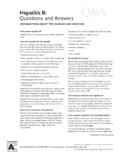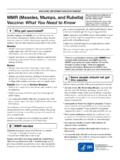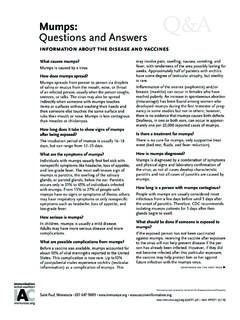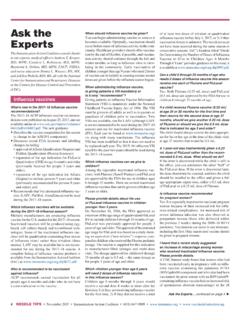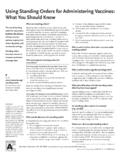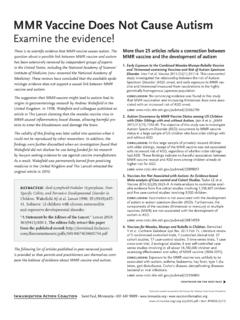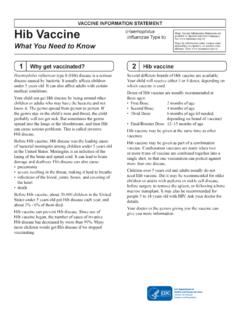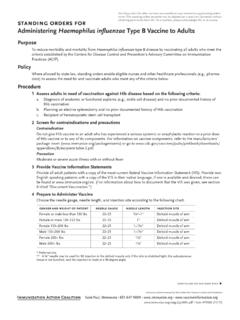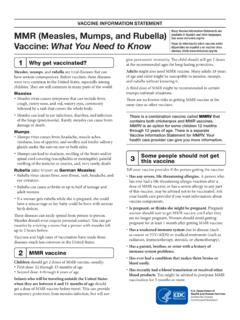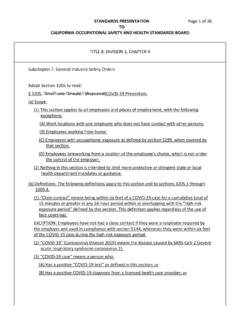Transcription of Vaccine Information Statement: Inactivated Influenza Vaccine
1 Depar tment of Health and Human Ser vices Centers for Disease Control and Prevention Vaccine Information STATEMENTMany Vaccine Information Statements are available in Spanish and other languages. See de informaci n sobre vacunas est n disponibles en espa ol y en muchos otros idiomas. Visite (Flu) Vaccine ( Inactivated or Recombinant): What you need to know 1 Why get vaccinated? Influenza ( flu ) is a contagious disease that spreads around the United States every year, usually between October and is caused by Influenza viruses, and is spread mainly by coughing, sneezing, and close can get flu.
2 Flu strikes suddenly and can last several days. Symptoms vary by age, but can include: fever/chills sore throat muscle aches fatigue cough headache runny or stuffy noseFlu can also lead to pneumonia and blood infections, and cause diarrhea and seizures in children. If you have a medical condition, such as heart or lung disease, flu can make it is more dangerous for some people. Infants and young children, people 65 years of age and older, pregnant women, and people with certain health conditions or a weakened immune system are at greatest risk. Each year thousands of people in the United States die from flu, and many more are Vaccine can: keep you from getting flu, make flu less severe if you do get it, and keep you from spreading flu to your family and other people.
3 2 Inactivated and recombinant flu vaccinesA dose of flu Vaccine is recommended every flu season. Children 6 months through 8 years of age may need two doses during the same flu season. Everyone else needs only one dose each flu Inactivated flu vaccines contain a very small amount of a mercury-based preservative called thimerosal. Studies have not shown thimerosal in vaccines to be harmful, but flu vaccines that do not contain thimerosal are is no live flu virus in flu shots. They cannot cause the are many flu viruses, and they are always changing. Each year a new flu Vaccine is made to protect against three or four viruses that are likely to cause disease in the upcoming flu season.
4 But even when the Vaccine doesn t exactly match these viruses, it may still provide some Vaccine cannot prevent: flu that is caused by a virus not covered by the Vaccine , or illnesses that look like flu but are takes about 2 weeks for protection to develop after vaccination, and protection lasts through the flu season. 3 Some people should not get this vaccineTell the person who is giving you the Vaccine : If you have any severe, life-threatening allergies. If you ever had a life-threatening allergic reaction after a dose of flu Vaccine , or have a severe allergy to any part of this Vaccine , you may be advised not to get vaccinated.
5 Most, but not all, types of flu Vaccine contain a small amount of egg protein. If you ever had Guillain-Barr Syndrome (also called GBS).Some people with a history of GBS should not get this Vaccine . This should be discussed with your doctor. If you are not feeling well. It is usually okay to get flu Vaccine when you have a mild illness, but you might be asked to come back when you feel better. 4 Risks of a Vaccine reactionWith any medicine, including vaccines, there is a chance of reactions. These are usually mild and go away on their own, but serious reactions are also people who get a flu shot do not have any problems with problems following a flu shot include: soreness, redness, or swelling where the shot was given hoarseness sore, red or itchy eyes cough fever aches headache itching fatigueIf these problems occur, they usually begin soon after the shot and last 1 or 2 serious problems following a flu shot can include the following: There may be a small increased risk of Guillain-Barr Syndrome (GBS) after Inactivated flu Vaccine .
6 This risk has been estimated at 1 or 2 additional cases per million people vaccinated. This is much lower than the risk of severe complications from flu, which can be prevented by flu Vaccine . Young children who get the flu shot along with pneumococcal Vaccine (PCV13) and/or DTaP Vaccine at the same time might be slightly more likely to have a seizure caused by fever. Ask your doctor for more Information . Tell your doctor if a child who is getting flu Vaccine has ever had a that could happen after any injected Vaccine : People sometimes faint after a medical procedure, including vaccination. Sitting or lying down for about 15 minutes can help prevent fainting, and injuries caused by a fall.
7 Tell your doctor if you feel dizzy, or have vision changes or ringing in the ears. Some people get severe pain in the shoulder and have difficulty moving the arm where a shot was given. This happens very rarely. Any medication can cause a severe allergic reaction. Such reactions from a Vaccine are very rare, estimated at about 1 in a million doses, and would happen within a few minutes to a few hours after the with any medicine, there is a very remote chance of a Vaccine causing a serious injury or safety of vaccines is always being monitored. For more Information , visit: 5 What if there is a serious reaction?
8 What should I look for? Look for anything that concerns you, such as signs of a severe allergic reaction, very high fever, or unusual of a severe allergic reaction can include hives, swelling of the face and throat , difficulty breathing, a fast heartbeat, dizziness, and weakness. These would start a few minutes to a few hours after the should I do? If you think it is a severe allergic reaction or other emergency that can t wait, call 9-1-1 and get the person to the nearest hospital. Otherwise, call your doctor. Reactions should be reported to the Vaccine Adverse Event Reporting System (VAERS). Your doctor should file this report, or you can do it yourself through the VAERS web site at , or by calling does not give medical advice.
9 6 The National Vaccine Injury Compensation ProgramThe National Vaccine Injury Compensation Program (VICP) is a federal program that was created to compensate people who may have been injured by certain who believe they may have been injured by a Vaccine can learn about the program and about filing a claim by calling 1-800-338-2382 or visiting the VICP website at There is a time limit to file a claim for compensation. 7 How can I learn more? Ask your healthcare provider. He or she can give you the Vaccine package insert or suggest other sources of Information . Call your local or state health department.
10 Contact the Centers for Disease Control and Prevention (CDC):- Call 1-800-232-4636 (1-800-CDC-INFO) or- Visit CDC s website at Vaccine Information Statement Inactivated Influenza Vaccine 42 300aa-2608/07/2015 Office Use Only
